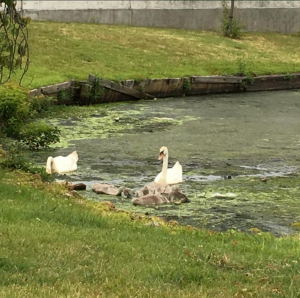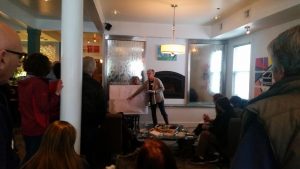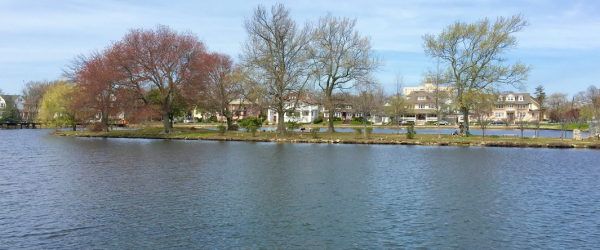Sunset Lake Commission Unveils Remediation Needs
Fundraising, Dredging, & Getting A Handle On The Weed And Geese Proliferation Included
Remedying the algae overgrowth that brings out an unbearable stench during the driest and warmest summer months will be multi-pronged, according to members of the Sunset Lake Commission and a team of area environmental agencies working in support of their efforts.
“We are all concerned and want what is best for the lake,” Chair Sue Henderson told the group of 80 who gathered Sunday evening at Hotel Tides. Henderson, a former councilwoman, has sat on the Wesley Lake and Deal Lake commissions.
In the immediate
There is a need to form a Friends of group to fundraise on behalf of the Commission, who cannot do so because they are an ad hoc municipal group that receives an annual stipend from the city.
Starting Small:
On advice from the Deal Lake Commission’s professionals the group began vetting the condition of the numerous storm grates that flow directly into the lake. For example, there is a metal grate at Bond and Sunset that serves as a flume, an outfall pipe that can be opened and closed [not completely] to protect from flooding but drains directly into Deal Lake.
“So what happens in Sunset affects Deal Lake,” Henderson [at right] said. “What a lot of towns are doing, an Asbury has done their fair share, is they take out the old grates and they put in an Eco grate.”
It won’t stop the cigarette butts [not biodegradable] but it will stop the floatables, the Styrofoam cups, and sediments that alter the lake’s water level.
“The thing is too, our public works department has to clean them on a regular basis,” she said. Henderson said DPW Superintendent Bill McClave sits on the commission.
The group will also look to work with Monmouth University’s Urban Coastal Institute, whose students study urban coastlines and lakes by conducting water quality tests. The culprits high on the list have been geese and dog waste as well as run off dangers like non organic fertilizer, oil and petroleum.
Getting a handle on the Weeds:
The City Council last week approved seasonal herbicide treatment by Trenton-based Black Lagoon Pond Management at an annual rate of $8,200, with three applications at a cost not to exceed $750 and $250 in permit fees.
“It’s a treatment that does not harm aquatic life,” Henderson said. “It has helped to control them.”
The Commission will also solicit a weed harvester at a cost of $2,800 per day for three days to take up the growth at the lake’s most western end.
Getting a handle on the Geese:
The first being the existing oiling of the eggs and the cataloging the nests, administered for the past 7 to 8 years by Tom Pivinski [at right] and Deputy Mayor Amy Quinn.
The second is planting of grass to prevent the geese from loitering at the water’s edge. City residents have been donating grasses to the Environmental Shade Tree Commission but a recently received grant will allow for plantings on April 8. Volunteers are needed.
Floating Islands:
Pivinski, head of the city’s Environmental Shade Tree Commission, is currently working to create the indigenous planting floats to help with the photosynthesis needs.
“Their purpose is to try to restore a situation completely naturally,” Pivinski said. “They are increasingly becoming more useful throughout the entire eastern seaboard because Sunset Lake is just one of the thousands of lakes that has algae blooms; especially in the last couple of years because they have been dry and they have been hot.
While they lost out on a $30,000 grant to construct the floating islands, his team will move ahead with the project at a cost of only $500.
Pivinski also said that while the sprinklers really don’t pose a threat to the ecosystem the fact that they rely on electricity is not necessarily the best for keeping the water body in purely organic state.
Long Term Goals
Dredging:
“Your main goal should be dredging,” Deal Lake Commission Chair Don Brockel [below] said. “It is absolutely number one.”
The estimated $3 to $4 million dredging process comes with the need to find a dewatering station and removal. The City, through its ongoing talks with iStar is vetting the possibility of turning the bed clearing over to the waterfront redeveloper.
“iStar has offered to eventually dredge that lake,” Councilwoman Eileen Chapman said. “The city would have to work with iStar to wrap the park and lake into the waterfront redevelopment plan for a certain amount of time, maybe a three year time.”
Re Stock:
Once the lake his back to its healthy state, the Commission hopes to restock the lake with trout. Years ago the lake was populated with bass through a grant.
Other projects:
There are a host of other initiatives that will need to be addressed, like the eroding walls, drop in storm drains for better filtering, and mending of out pipes attached to the flumes.
Working in Tandem:
Chapman said the Commission will look to work with the existing Wesley and Deal Lake  commissions since many of the permitting and professional needs are the same. This will take some vetting since the other commissions are comprised of neighboring towns who have a proportionate say in the organizations’ policies and projects.
commissions since many of the permitting and professional needs are the same. This will take some vetting since the other commissions are comprised of neighboring towns who have a proportionate say in the organizations’ policies and projects.
“You guys are a big part of the watershed, you are a fraction of it but I think you are a key part because whether you know it or not Sunset Lake flows into Deal Lake.”
Student Volunteer Program:
School district music educator Karen Lee Schwarz brought up the possibility of getting high school students to help with the regular lake cleanings and grass plantings as well as organizing benefit concerts in the park to help fund the ongoing maintenance projects.
—————————————————————–
Follow the Asbury Park Sun on Facebook, Twitter and Instagram.
The Asbury Park Sun is affiliated with the triCityNews newspaper.







